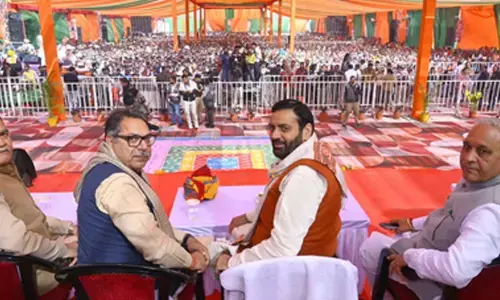For a more symmetric approach

Disaster Management (Amendment) Bill 2024
I strongly feel that the highest executive positions in NDMA, as well as the state and district level counterparts, should be manned by persons chosen for their proven administrative ability, technical competence, and established leadership qualities. Creating greater space, for the local authorities, such as the PRIs in the DM paradigm, is a welcome suggestion. It should, however, be clearly understood, that these bodies can only extend support, to field level activities, such as rescue, relief and rehabilitation, and not the other parts of the DM continuum. There is also need to establish a framework, of indices and weightages, which will enable the measurement, year after year, of the efficacy of the extant DM effort. A proposal suggesting putting in place a Disaster Preparedness Index for the country, prepared by this columnist, is pending with the Government of India
Asnoted in the previous part, the belief that the Universe was created by a Supreme Being, who also controls all that happens in it, is as old as humankind.
For example, in the 19th century, people in Britain believed that England’s conquests in India had a providential purpose; to Christianise India through an alliance of Church and Empire. To this day, Britain envisages dual control, of its polity, of the Church and the Crown. God, it is believed, stands for destiny, while the Crown represents free will, through the functioning of the democratic form of governance.
Likewise, the official motto of the United States of America, is, “In God, We Trust”, the theme owing its origin to the supporters of the Union, in the American Civil War, who used it to boost the morale of the people. It is customary, for certain events to be regarded as the results of free will. Others such as natural calamities, like floods or earthquakes, are considered as ‘Acts of God’.
Events which bring happiness, or pleasure, are attributed to ‘Lady Luck’ or ‘Dame Fortune’; fortune being personified in the form of a woman, with what she brings often described as a ‘Godsend’. On the other hand, if something unfortunate transpires, or a person fails in something, it is said that that person’s ‘fate was sealed’. Or, put differently, that the attempt was ‘ill fated’, or caused by a ‘twist of fate’.
Poor and ignorant people, often stubbornly attribute their travails to fate, regarding their plight as unchangeable and unavoidable, called a ‘fatalistic’ attitude. Instances are not unknown, of victims of natural disasters refusing assistance, as they believe that God’s will should not be interfered with. Many expressions are used to convey such a belief. “Man proposes, but God disposes” is one such. “Que sera sera”, or “whatever will be, will be,” or to use a popular Urdu phrase, “Muddai laakh bura chahe to kya hota hai,” also speak of such an attitude, namely, of being resigned to the inevitability of the happenings in the future, ‘Ram Bharose’, is another popular Hindi, expression, which is used when one has exhausted all avenues of human effort, and can only trust in destiny, or God, to succeed.
I recall, in this, context, an incident more than six decades ago from my post-graduation days, in Osmania University. I was a student of M Sc Mathematics. One Apppalacharyulu, a nonagenarian retired school teacher, was living in the Gaddiannaram area of Hyderabad city. He was part of a group of school teachers in Mathematics. In the evenings, after college hours, I would share with him what I learnt during the day. When the time came for the examinations, at the end of the first year, Apppalacharyulu, having done all the preparation that was in his ability, stood before a calendar, bearing the picture of Lord Venkateswara, and with folded hands, said, “now you do whatever you want“, and proceeded to the examination hall.
Einstein, the great scientist, formerly believed that natural laws could not be creatures of randomness and uncertainty. Therefore, although essentially an atheist, he refused, initially, to accept the basic principles of Quantum Theory, such as the Principle of Uncertainty and the Wave Particle Duality, as proposed by contemporary scientists such as Planck, Bohr, Pauli, Dirac and Schrodinger, saying, “God does not play dice.”
It is not difficult to appreciate the reservation that was gnawing away at Einstein’s logical brain. Based on the Principle of Uncertainty, put forth by another great scientist, Heisenberg, the Austrian physicist Schrodinger devised a Thought Experiment, according to which, a hypothetical cat may be considered both alive, and dead, simultaneously. The cat’s fate is linked to a random event which may or may not occur. You seal a cat in a box, with something that can eventually kill it, like, for instance, some radioactive substance controlling a vial of poison. When the substance decays, it triggers a Geiger counter that causes the poison to be released, killing the cat. Since the box is locked, and we on the outside, cannot know whether or not the radioactive substance gas decayed and released the poison, we cannot tell if the cat is dead or alive. We will not know whether the cat is alive or dead until we open the box. So, until the moment we open the box and actually observe the cat, the cat is both simultaneously dead and alive! When even we, ordinary persons, can appreciate the absurdity of the proposition, one can hardly blame Einstein for giving it with disbelief.
The interplay, as between the devine force and free will, and the inevitability of the supremacy of destiny, or God’s will, is brought out, in a most telling fashion, in the story of King Pareekshit, in the Hindu Epic Mahabharat. The King is given a second life by Lord Krishna, after being killed while still in his mother’s womb, by Ashwatthama, the son of the Guru of the Pandava and Kaurava Princes, by way of revenge against the Pandavas, for killing his relatives and friends.
Later in his life, Pareekshit visits the home of sage Shamika, who fails to notice the presence of the king, as he is engrossed in deep meditation. Pareekshit, infuriated by being ignored, puts a dead snake around the neck of the sage. And Shamika’s son, Shrungi, angered by Paeekshit’s that action, curses the king to die of a snake bite, on the seventh day from that day. Unhappy with what his son has done, the sage dispatches a messenger to warn the King of his impending fate. Pareekshit takes refuge in a well-guarded mansion standing on a single column. On the seventh day, however, Takshaka, the King of Naga Loka, or the Kingdom of Snakes, comes to the king in the form of a worm in fruits and bites Pareekshit, killing him.
One way of looking at this somewhat tricky issue is to understand that religion, and faith in God, are, by their very nature, not creatures of logic. The ability to suspend disbelief is required in order unquestioningly to trust in destiny. Jesus Christ or, for that matter, Mother Teresa, performing miraculous cures, are examples of such a situation. The consequences of the exercise of free will, on the other hand, can be predicted with reasonable degree of accuracy on the basis of logical premises and rational analysis.
While on the subject of God, I once came across a riddle, which asks whether, assuming God is omnipotent, He can make a stone, so big that He cannot Himself move it. Clearly, if he can move it, He cannot make it and if He can make it, He cannot move it! A fallacious question, by its very structure, also known as a self-addressing proposition.
At this stage, I must confess that I am a believer. I therefore believe that the human mind, which is also a part of the human being, is incapable of contemplating phenomena beyond the ability granted to it by the Creator. Thus, it is a contradiction, in terms, to try and understand the nature, or the intentions, of the Supreme Being. And, having made that statement, I rest my case.
A Christian, arrived at the Gates of Heaven. He sees that there are two lines going in. One has a sign that reads “predestined,” and the other, “free will”. He naturally heads to the predestined line.
While waiting, an angel comes and asks him “Why are you in this line?” He replies, “Because I chose it.”
The angel looks surprised, “Well, if you ‘chose’ it, then you should be in the free will line.”
So our Calvinist, now slightly miffed, obediently wanders over to the free will line.
Again, after a few minutes, another angel asks him, “Why are you in this line?”
He sullenly replies, “Someone made me come here.”
(The writer was formerly Chief Secretary, Government of Andhra Pradesh)
















